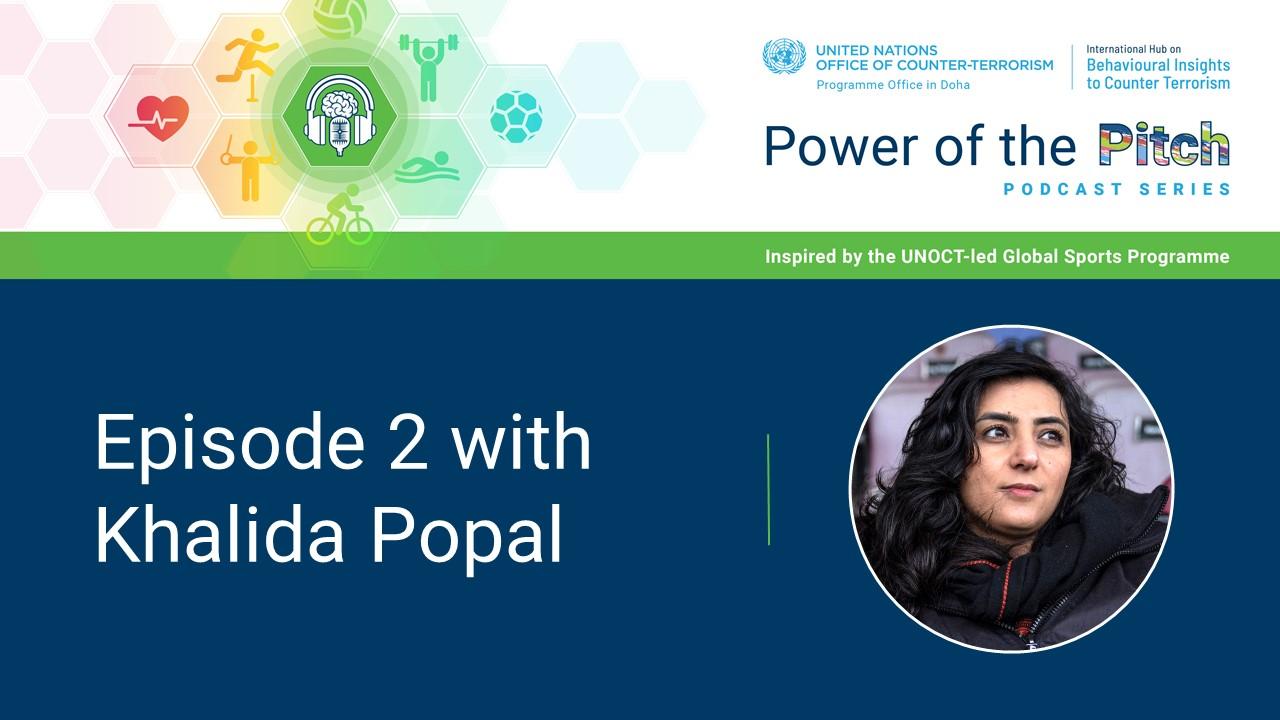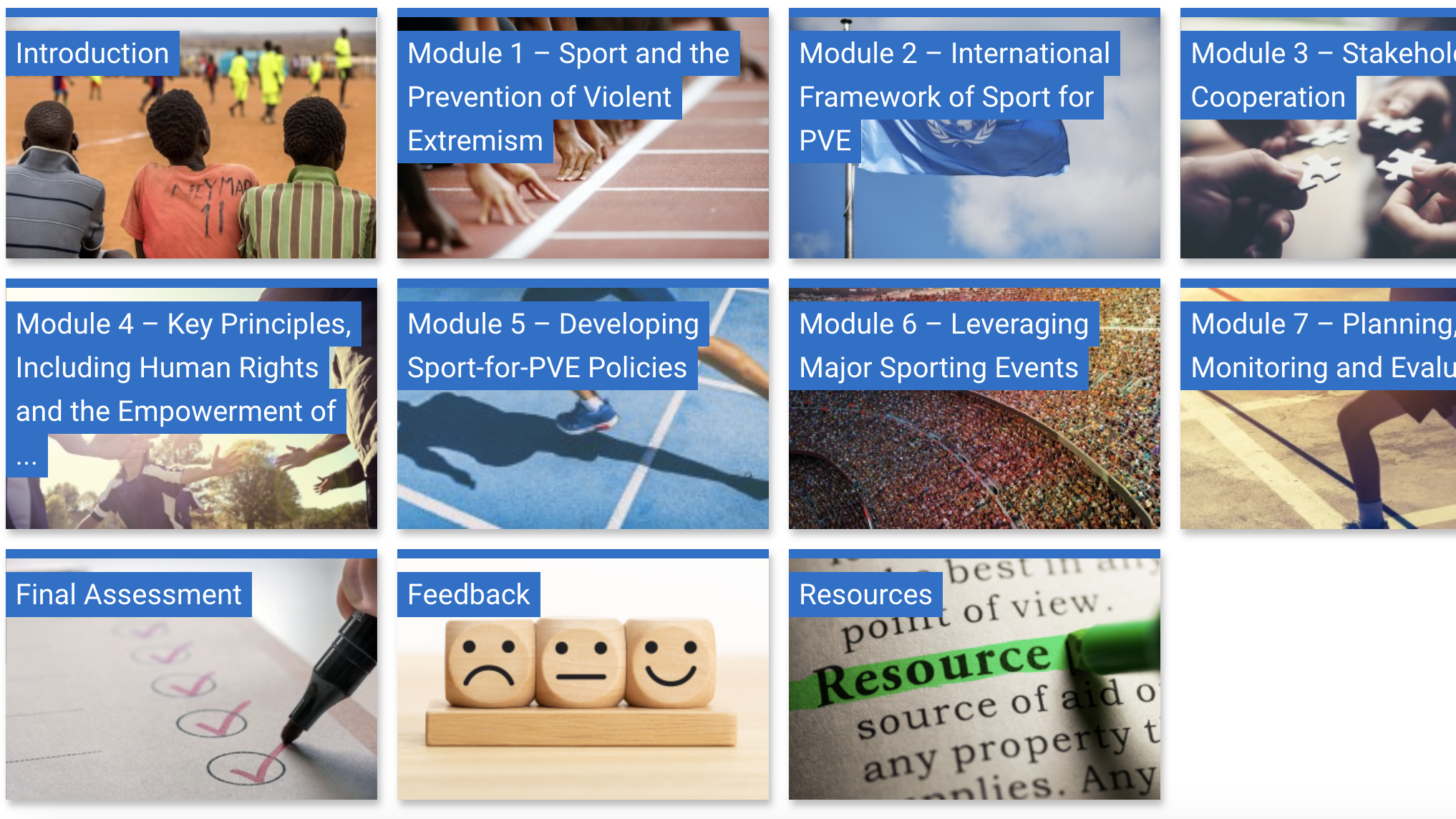#SportDay 2024: UNOCT highlights the role of sports as a tool to build peace and prevent violent extremism

The International Day of Sport for Development and Peace, celebrated annually on 6 April, recognizes the positive influence of sport in promoting peace, fostering development, and building community cohesion. The global theme for the 2024 commemoration is Sport for the Promotion of Peaceful and Inclusive Societies.
Sport has the power to unite people and uplift communities. It promotes respect, inclusion, and equality as well as empowers women and youth, helping to fight discrimination and prevent violent extremism conducive to terrorism. Major sporting events can promote positive values, attain a large popularity, and leave a thriving socio-economic legacy in host countries. However, they can also be threatened by terrorist groups not only for the opportunity to cause massive incidents, but for representing what terrorists aim to destroy.
Since 2020, the UNOCT-led Global Sports Programme has supported Member States in protecting major sporting events as a good of humanity and in leveraging the power of sports to strengthen social cohesion and build resilience to negative influences.
This #SportDay, we share the stories of some of the inspiring young people and professional athletes from around the world that UNOCT partners with.
Sport is #MoreThanAGame.
Hear from professional footballer and UNESCO Ambassador Dr. Nadia Nadim how sport helped her overcome life’s hurdles and succeed at reaching her goals.
#MoreThanAGame is a global digital campaign, highlighting stories of professional athletes and young people whose lives have been changed through sport, and encouraging youth to take up sport and learn from its positive values. The Campaign was launched alongside the 2022 FIFA World Cup in Qatar.
For more information and to join the campaign, please visit: https://www.un.org/counterterrorism/morethanagame-campaign

Ester Nabatanzi
Ester Nabatanzi is a community activist from Mirambiro Village in southwest Uganda. She is also a certified netball coach, who has demonstrated experience working alongside both refugees and non-refugees in her community through a local civil society organization, Integrated Community Development Initiative (ICODI).
Growing up in a family reliant on agriculture for income generation, she explains, “When I learned of the government’s plans to use our land to host refugees coming from conflict-stricken countries, I became distressed. Soon, my behaviour was hateful and violent towards these refugees.”
However, her outlook changed, when she discovered ICODI where she started embracing the social values that she learned through sport. Between 2021-2023 ICODI was a recipient of the Civil Society Organization Grant Scheme by UNOCT’s Global Sports Programme. The micro-grants support the implementation of community-level efforts to counter-terrorism and prevent/counter violent extremism (CT/PCVE) through sports with a focus on women-led and youth organizations. In participating in a training of trainers to strengthen youth leadership, Ester learned how to mix her skills as a netball coach to bridge divides between youth in her community, including both refugees and non-refugees.
“I used my skills to train youth to continue engaging in sport, regardless of their differences, promoting gender equality, and diversity in communities that were once facing tensions and conflicts. Since then, I continue to share the lessons I have learned through my personal journey as I advocate to a global audience for how sport can address gender-based violence and promote peace and harmony.”

Kelsey McCormick
Kelsey McCormick is a young woman from Northern Ireland, United Kingdom who used sports to work through difficult times in her life. Losing her grandfather during the COVID-19 pandemic took an emotional toll on Kelsey and she soon started getting in trouble, going out with the wrong crowds, getting arrested, and self-harming. Playing sports and joining a programme of the Irish Football Association gave her the confidence to get back out there, connect with others and gain new skills for a better life.
“Sport has helped me to deal with a lot of my challenges in the last couple of years. It has given me a lot of confidence to move forward in my life. I feel like Sport equips you with valuable skills because it gives you a lot of self-control, it gives you a lot of freedom, it gains you new friends.” Speaking of sport as a positive pathway, she add “Sports have helped me gain lots of different skills. Good communication skills, good teamwork skills, leadership skills. In the future I see myself working with young people in sport and trying to encourage people into sport.”
Kelsey now passes on the lessons she learnt to others, using her story to help young people from similar backgrounds and becoming a force for good in her community.

Leila Benabdallah
Leïla Benabdallah is a young leader from France dedicated to promoting global peace and sustainability. A current member of UNOCT’s Working Group on Youth, Sports, and Preventing Violent Extremism, Leïla also works to facilitate meaningful connections among students to cross cultural barriers, and foster mutual understanding as a Vice President of the Erasmus+ Students and Alumni Network.
Leïla participated in the United Nations-African Union Sports Council Youth ForumPDF in Accra, Ghana through UNOCT’s Global Sports Programme. Alongside 20 other youth leaders from 19 countries across Africa, she engaged key decision-makers through dialogue and discussion about the power of sports and major sporting events to counter and prevent violent extremism, as well as the important role she and other youth like her play.
“Violent extremism knows no boundaries of religion, ethnicity, or gender; it arises from a complex context with multiple contributing factors, including conflicts, lack of mutual understanding, and limited access to basic resources. Through the UN-AUSC Youth Forum, I witnessed first-hand the transformative power of sports in social change. This experience has not only inspired me but also reaffirmed my resolve to continue advocating for inclusive initiatives that harness the potential of sports to build cohesive societies.”
She further explains, “By addressing fundamental pillars to global peace and security, and ensuring that all women, as well as men, have equal access to opportunities, I can continue to lay the foundations necessary for a more inclusive and harmonious society, where every individual can thrive and contribute to a brighter future.”

Masereka Wilber
Masereka Wilber is a refugee from the Democratic Republic of the Congo who participated in a sports programme by the Integrated Community Development Initiative (ICODI), funded by a UNOCT’s Global Sports Programme microgrant.
When war broke out in his home country, Masereka developed post-traumatic stress disorder which kept him isolated for some time and made it difficult for him to connect with others. However, football changed that, teaching Masereka the values he needed to turn his life around after conflict, and helping him connect with people from different backgrounds and overcome prejudices.
“Sports introduced me to people with different nationalities, cultures, and religions. That introduction changed my life. On the pitch we play as a team and have the same goals. These sports values can be easily transferred from the pitch to the community. Values like discipline, tolerance, respect help to change communities because it creates peace in the community.”



